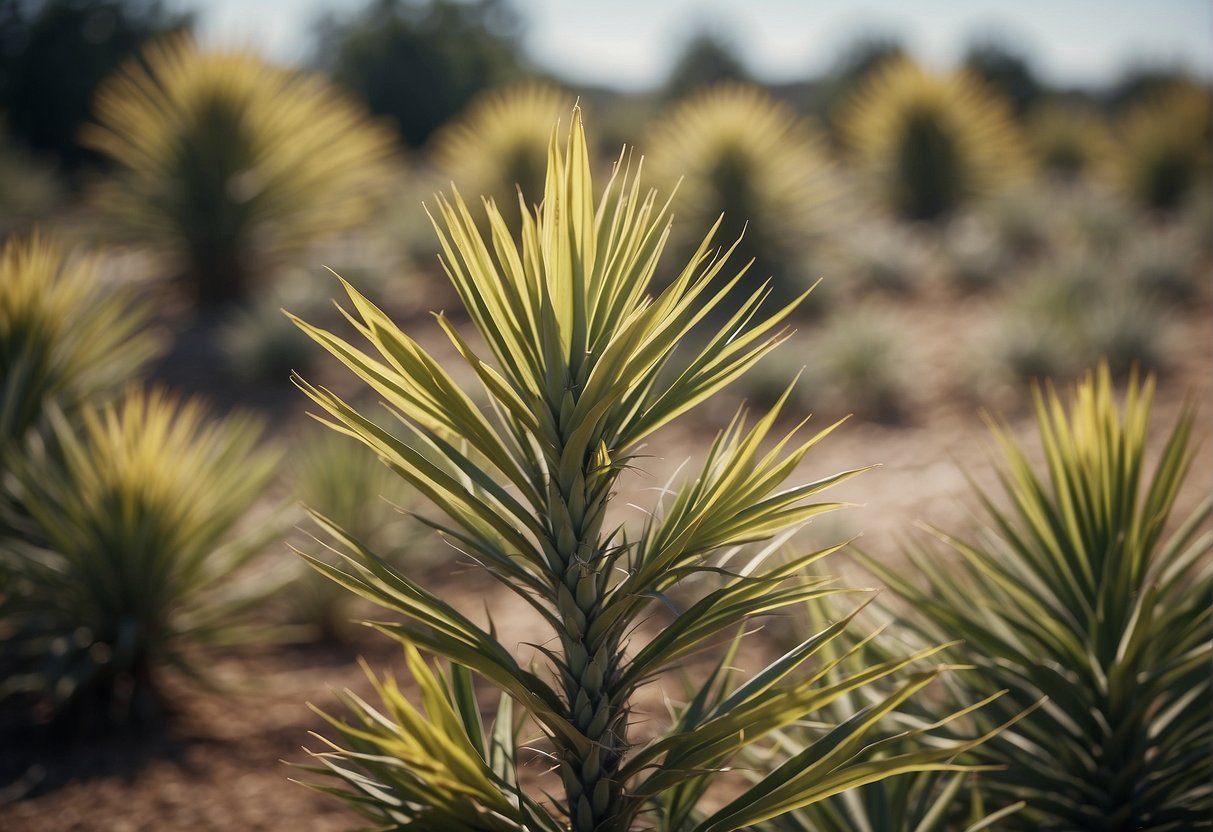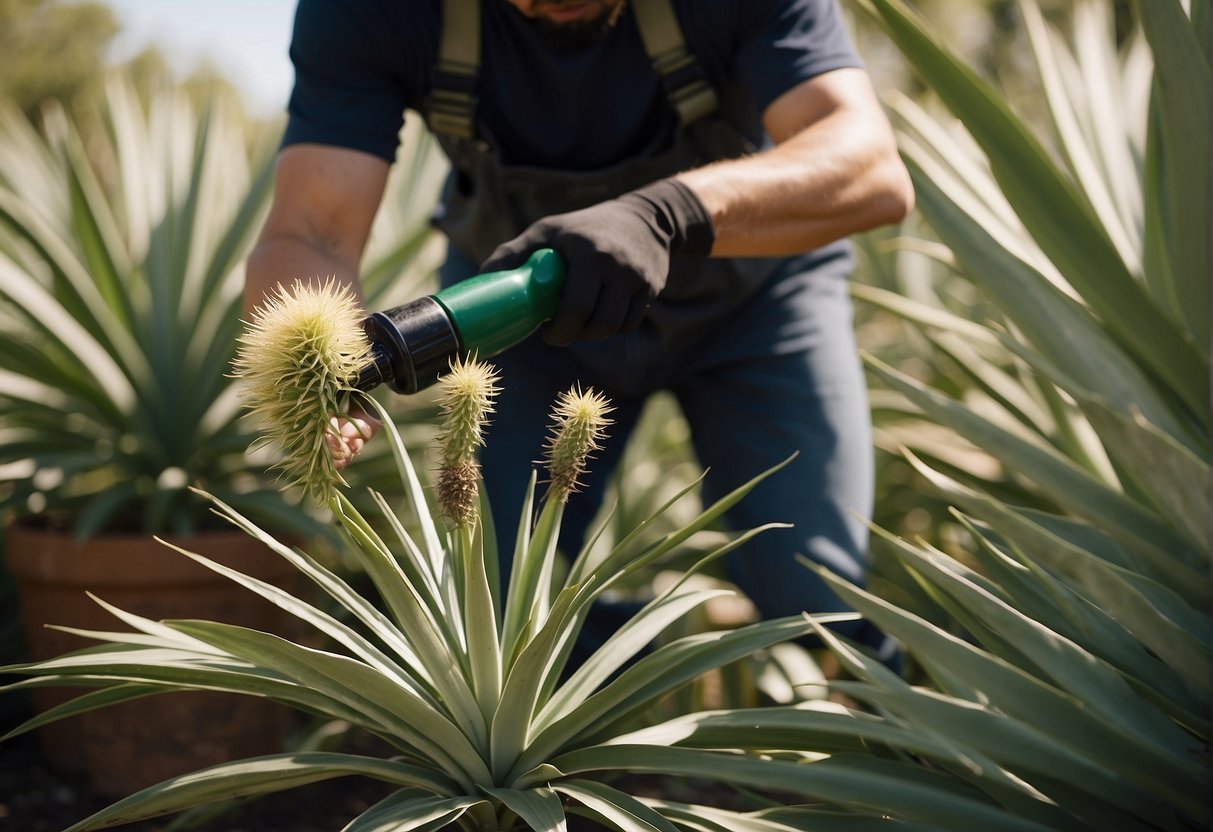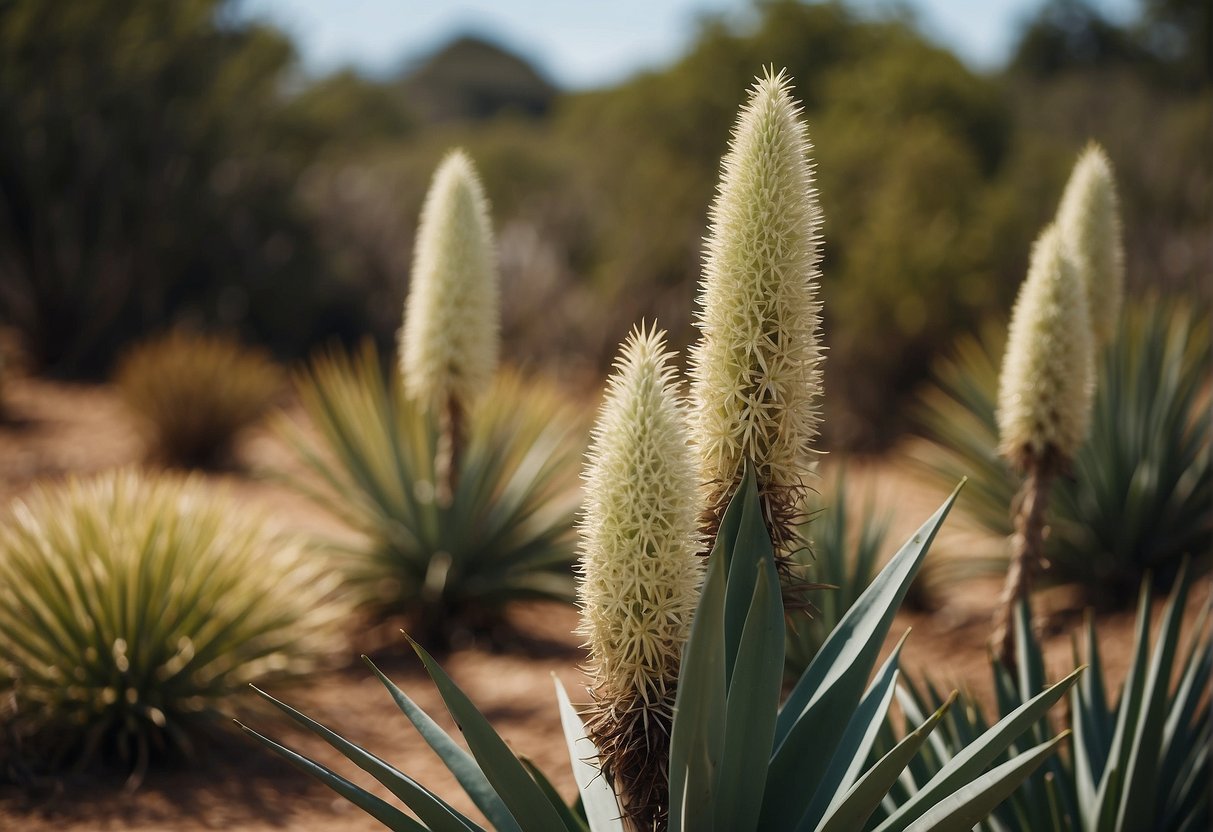Yucca plants can enhance any setting with their lush greenery and distinct texture. Yet, if not managed correctly, they can overtake your garden. Known for their durability and ability to endure, yuccas pose a challenge when it comes to eradication after they have settled in. Additionally, the task of removing yucca plants is complicated due to their deep-rooted system, which could potentially harm neighboring plants. For insights on how to eliminate yucca plants without negatively impacting the rest of your garden, continue reading.

Understanding Yucca Plants
Before diving into effective yucca plant removal methods, it’s important to understand the plant’s growth habits. Yucca plants are native to arid regions and can tolerate drought, heat, and poor soil conditions. They have a deep root system that can extend up to 30 feet underground, making them difficult to remove entirely. Additionally, yucca plants can produce offsets or baby plants that grow from the parent plant’s roots, thereby spreading the plant further.
Effective Yucca Plant Removal Methods
There are several methods to remove yucca plants effectively. One way is to dig out the entire plant, including the roots. However, this method can be challenging and time-consuming, especially if the yucca plant has an extensive root system. Another option is to use herbicides, but this approach can harm surrounding plants if not used properly. A third option is to cut the plant down to its base and apply herbicide directly to the cut stem. This method can be effective, but it may take several applications to kill the plant entirely.
Key Takeaways
- Yucca plants are hardy and resilient, making them difficult to remove once established.
- Yucca plants have a deep root system and can produce offsets, making them challenging to eradicate entirely.
- Effective yucca plant removal methods include digging out the entire plant, using herbicides, or cutting the plant down to its base and applying herbicide directly to the cut stem.
Understanding Yucca Plants

Yucca plants are a type of perennial shrub that are native to arid regions of North and Central America. They are known for their distinctive sword-shaped leaves and tall flower spikes. While they can be a striking addition to a garden, they can also become invasive and difficult to control.
Identify the Yucca
There are many different species of yucca plants, but they all share some common characteristics. Yucca plants typically have thick, fleshy leaves that are arranged in a rosette pattern. They also have a woody stem that can be either erect or branching. The flowers of yucca plants are typically white or cream-colored and are borne on tall spikes.
Growth and Resilience Characteristics
Yucca plants are known for their rapid growth and resilience. They are drought-tolerant and can survive in a wide range of soil types. Yucca plants can also reproduce quickly, either through seed production or by sending out underground stems called rhizomes.
When it comes to controlling yucca plants, it’s important to understand that they are tough and resilient. Simply cutting them back or pulling them up by the roots may not be enough to get rid of them. In fact, cutting back yucca plants can actually stimulate new growth.
In order to effectively control yucca plants without harming surrounding plants, it’s important to use a targeted approach. This may involve using herbicides or other chemical treatments, but it’s important to use these products carefully and according to label instructions. Another option is to physically remove the yucca plants by digging up the roots, but this can be a difficult and time-consuming process.
Overall, understanding the growth and resilience characteristics of yucca plants is key to controlling them effectively. By using a targeted approach and taking care not to harm surrounding plants, you can effectively eliminate yucca plants from your garden.
Effective Yucca Plant Removal Methods
If you want to remove yucca plants without harming surrounding plants, there are several methods you can use. These methods include manual removal techniques, chemical control strategies, and natural and alternative methods.
Manual Removal Techniques
Manual removal is a safe and effective way to get rid of yucca plants. To do this, you will need pruning shears, a saw, or an axe. Before you start, make sure you wear protective clothing, gloves, and safety goggles to protect yourself from the sharp foliage.
To remove a yucca plant, start by cutting back the new growth and shoots. Next, cut the foliage down to the stump. Then, dig around the root system and remove the entire root ball. Finally, dispose of the stump and root ball properly.
Chemical Control Strategies
If manual removal is not an option, you can use herbicides to kill yucca plants. Glyphosate is a non-selective herbicide that can effectively kill yucca plants. You can also use stump killer or other non-selective herbicides to kill the plant.
When using herbicides, make sure you follow the instructions on the label carefully. Wear protective equipment, such as gloves and safety goggles, and avoid spraying the herbicide on surrounding plants.
Natural and Alternative Methods
If you prefer natural or alternative methods, you can try suffocating the yucca plant by covering it with cardboard or black plastic sheeting. This will prevent sunlight from reaching the plant and eventually kill it.
You can also use salt, Epsom salt, vinegar, or a herbicide mix with vegetable oil to kill the yucca plant. However, these methods may harm surrounding plants, so use them with caution.
In summary, removing yucca plants without harming surrounding plants is possible. You can use manual removal techniques, chemical control strategies, or natural and alternative methods to get rid of the plant. Whatever method you choose, make sure you wear protective clothing and dispose of the plant properly.
Frequently Asked Questions

What is the most effective herbicide for eliminating yucca plants without harming nearby flora?
Glyphosate-based herbicides are often effective in killing yucca plants without harming surrounding plants. However, it’s important to follow the instructions on the label carefully to ensure safe and effective use.
Can boiling water be used to safely remove yucca roots in the presence of other plants?
Boiling water can be an effective way to kill yucca roots, but it can also harm surrounding plants. It’s best to use this method only in areas where the yucca plant is isolated from other plants.
How can I prevent yucca plants from regrowing after removal?
To prevent yucca plants from regrowing, it’s important to remove as much of the root system as possible. You can also apply a pre-emergent herbicide to the soil to prevent new growth.
What methods are available for safely extracting large yucca plants without affecting the surrounding garden?
One method for safely extracting large yucca plants is to dig around the plant and cut the roots as close to the plant as possible. You can then use a shovel or other tool to lift the plant out of the ground. Be sure to remove as much of the root system as possible to prevent regrowth.
Is it possible to use household vinegar as a selective yucca plant killer?
While vinegar can be effective in killing some plants, it is not a selective herbicide and can harm surrounding plants. It’s best to use a targeted herbicide specifically designed for yucca plants.
Are there any natural remedies to control yucca plant growth without damaging other plants?
Some natural remedies for controlling yucca plant growth include hand weeding, mulching around the plants, and using a natural herbicide containing ingredients such as clove oil or citric acid. However, it’s important to note that these methods may not be as effective as chemical herbicides and may require multiple applications.














